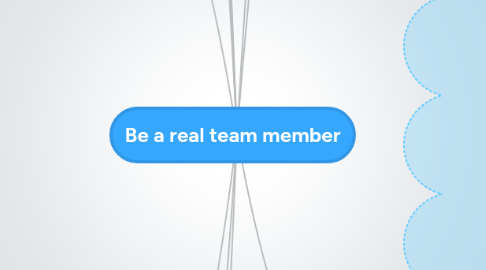
1. Quote
2. Clicking and engaging
3. Engage
3.1. occupy or attract (someone’s interest or attention)
4. Relationship
4.1. the way in which two or more people or things are connected, or the state of being connected
5. Interest
5.1. the feeling of wanting to know or learn about something or someone
6. Motivate
6.1. provide (someone) with a reason for doing something
7. Tony Bruce
7.1. @tonybruce77
7.2. http://dancedwiththetester.blogspot.co.uk/
8. Models
8.1. (Dr. R. M.)Belbin Team Roles
8.1.1. Dr Meredith Belbin studied team-work for many years, and he famously observed that people in teams tend to assume different "team roles".
8.1.2. Broad classification
8.1.2.1. Action Oriented Roles
8.1.2.2. People Oriented Roles
8.1.2.3. Thought Oriented Roles
8.1.3. He defined a team role as "a tendency to behave, contribute and interrelate with others in a particular way"
8.1.4. Plant
8.1.5. Resource Investigator
8.1.6. Co-ordinator
8.1.7. http://www.belbin.com/
8.1.8. Shaper
8.1.9. Monitor Evaluator
8.1.10. Teamworker
8.1.11. Implementer
8.1.12. Completer Finisher
8.1.13. Specialist
8.1.14. The key is balance.
8.2. Benne and Sheats' Group Roles
8.2.1. Identifies both positive and negative behaviour within a group
8.3. Margerison-McCann Team Management Profile
8.3.1. Psychometric tool used for team development, which measures people's preferences for gathering information, relating to others, making decisions, and organizing themselves and others
9. The Five Dysfunctions of a Team - Patrick Lencioni
9.1. Absence of trust—unwilling to be vulnerable within the group
9.2. Fear of conflict—seeking artificial harmony over constructive passionate debate
9.3. Lack of commitment—feigning buy-in for group decisions creates ambiguity throughout the organization
9.4. Avoidance of accountability—ducking the responsibility to call peers on counterproductive behavior which sets low standards
9.5. Inattention to results—focusing on personal success, status and ego before team success
10. What we're doing
10.1. Engage, Relationship, Interest, Motivate
10.2. Models
10.2.1. Belbin Team Roles
10.2.2. Benne and Sheats' Group Roles
10.2.3. Margerison-McCann Team Management Profile
10.3. What Makes a Good Team Member?
10.4. Day to day
11. Recap
11.1. Engage, Relationship, Interest, Motivate
11.2. Models
11.2.1. Belbin Team Roles
11.2.2. Benne and Sheats' Group Roles
11.2.3. Margerison-McCann Team Management Profile
11.3. What Makes a Good Team Member?
11.4. Day to day
12. What makes a good team member?
12.1. What?
12.2. How?
12.3. When?
12.4. Why?
12.5. Who?
12.6. Where?
13. References
13.1. https://sites.google.com/site/724ecialdiniwiki/chapter-1-weapons-of-influence/chapter-2-reciprocation
13.2. http://www.oxforddictionaries.com/
13.3. I Want You to Cheat!: The Unreasonable Guide to Service and Quality in Organisations - John Seddon
13.4. Poke The Box - Seth Godin
13.5. Some images from http://pixabay.com/
13.6. http://www.mindtools.com
13.7. http://www.belbin.com/
13.8. http://flowchainsensei.wordpress.com/2012/09/26/how-to-give-feedback/
14. Day to day
14.1. Positive action over positive thinking
14.1.1. think AND do
14.2. Ask the questions
14.3. Feedback
14.3.1. Express what you do want, rather than what you don’t want.
14.3.2. Avoid vague, abstract or ambiguous phrases
14.3.3. This is what you did; This is what I feel; This is the need of mine that was met.
14.4. Reciprocation
14.4.1. Rule Of
14.4.1.1. rule essentially states that if someone gives something to us, we feel obligated to repay that debt
14.4.2. Give help
14.4.3. Ask for help
14.4.4. give and take
14.5. Acknowledge, never dismiss or ignore
14.5.1. Example: Flagged a issue, dismissed as 'your job'
14.5.2. Assuming only hierarchical status have valid opinions
14.5.3. Making people wait
14.6. Breaking bread
14.6.1. The best ideas are shared over food
14.7. Listen
14.7.1. Information is the means of improvement
14.8. Beware of the curse of knowledge
14.8.1. cognitive bias
14.8.2. can be off-putting
14.8.3. can leave people feeling dejected
14.8.4. why the should care?
14.9. Sounding board
14.10. Appreciate any input
14.10.1. Why?
14.11. Beliefs followed by behaviours
14.12. Find people who work because they believe over people who work for a pay cheque
14.13. Perspective
14.13.1. Example: Let go but learned
14.14. Invest time with people whose work crosses organisational boundaries
14.15. Think
14.16. Reliability
14.17. Dot the i's and cross the t's
14.17.1. Problems don't lie in the philosophy of procedures but in practice, and practice is goverened by attitude
